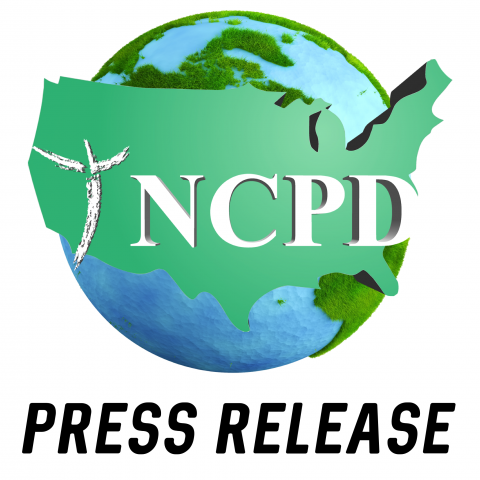
FOR IMMEDIATE RELEASE
July 16, 2015
Contact: Janice Benton
202-529-2933
202-529-2934 (tty)
202-529-4678 (fax)
jbenton@ncpd.org
WASHINGTON, DC - The Interfaith Disability Advocacy Coalition (IDAC), a program of the American Association of People with Disabilities (AAPD), will host From Access to Belonging, an interfaith worship service celebrating the progress and promise of the ADA on Sunday, July 26 at 3:00 p.m. at First Trinity Lutheran Church, 309 E Street, NW, Washington, D.C.
Speakers for the event are Dilshad Ali, Advisor, Enabled Muslim, and Editor-in-Chief, AltMuslim at Patheos; David Saperstein; and Mark Johnson, Director of Advocacy, Shepherd Center, and Chair, ADA Legacy Project. The event will feature the presentation of The Thornburgh Family Award to Rabbi Lynne Landsberg. Established by AAPD this year during the 25th anniversary year of the ADA, the Thornburgh Family Award recognizes a religious leader who exemplifies the spirit of the ADA as demonstrated by Dick and Ginny Thornburgh’s efforts to expand opportunities for people with disabilities. Juliette Rizzo, Deputy Director, Special Projects, partnerships and Events, U.S. Departments of Education, will serve as the emcee.
The National Catholic Partnership on Disability (NCPD) is one of 33 denominational members of IDAC seeking to mobilize the religious community to speak out and take action on disability policy issues.
Janice Benton, NCPD executive director, attended the ADA signing ceremony by then President George H.W. Bush, one of the largest such ceremonies ever, which took place on the White House lawn, partly because so many wanted to be there, and partly because the executive mansion itself hadn't been made completely accessible. Benton notes an important historic fact, “In 1978 the U.S. Catholic Bishops issued a Pastoral Statement on Persons with Disabilities. The following excerpt of this Pastoral Statement was read on the Senate floor by one of the introducing sponsors of the ADA:”
"Defense of the right to life implies the defense of other rights which enable the individual with a disability to achieve the fullest measure of personal development. . . . These include the right to equal opportunity in education, in employment, in housing, as well as the right to free access to public accommodations, facilities and services. Passage of this bill will mean discrimination solely on the basis of handicaps will be not only immoral but illegal."
Faith resources related to the ADA and accommodations are now abundantly available to welcome persons with disabilities as members of faith communities. For example, earlier this year, IDAC partnered with the ADA Legacy Project, the Collaborative on Faith and Disability, and the ADA National Network to develop a proclamation for faith communities to commit to full implementation of the ADA, worship and education resources that can be tailored to specific religious traditions and communities of faith, and an ADA25 and Faith Facebook page for sharing ideas, questions, activities, and resources. NCPD produced
####
More about the organizations listed
The Interfaith Disability Advocacy Coalition is a diverse, nonpartisan coalition of 33 national religious organizations from the Christian, Jewish, Muslim, Hindu, and Sikh traditions whose core spiritual values affirm the rights and dignity of people with disabilities. Visit http://www.aapd.com/what-we-do/interfaith/ for more information.
The American Association of People with Disabilities is the nation's largest disability rights organization. We promote equal opportunity, economic power, independent living, and political participation for people with disabilities. Our members, including people with disabilities and our family, friends, and supporters, represent a powerful force for change. To learn more, visit the AAPD Web site: www.aapd.com.
Since 1982, NCPD has served the U.S. Catholic Church by providing resources, training, consultation and advocacy for the estimated 14 million U.S. Catholics who live with a disability. The USCCB refers to NCPD matters dealing with access to faith for persons with disabilities. Visit http://www.ncpd.org for more information on NCPD’s programs and services.
